<< Previous | Displaying results 341-350 of 571 for "" | Next >>
Aron was born to a middle-class Jewish family in Slonim, a part of Poland between the two world wars. His parents owned a clothing store. After studying in a technical school, Aron worked as a motion-picture projectionist in a small town near Slonim. The Soviet army took over Slonim in September 1939. War broke out between Germany and the Soviet Union in June 1941. Aron returned to Slonim. The Germans soon occupied Slonim, and later forced the Jews into a ghetto. Aron was forced to work in an armaments…
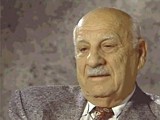
Felix was born to an assimilated Jewish family in Lublin, Poland. His father was a locksmith and his mother was a singer. Following the German invasion of Poland on September 1, 1939, Felix fled east to Rovno and then to Soviet-occupied Lvov, where he was accepted at a medical school. After the German invasion of the Soviet Union in June 1941, Felix was taken to a labor camp. He escaped and returned to Lublin, and found that his family had been forced into the ghetto established there. After the…
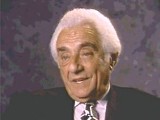
While Frima's family was confined to a ghetto, Nazis used her father as an interpreter. He later perished. By pretending not to be Jews, Frima, her mother, and sister escaped a German mobile killing unit massacre. They were later discovered and jailed. Again, her mother devised an escape. Frima's mother and sister were smuggled to Romania, while Frima wandered in search of safekeeping until her mother could arrange to smuggle her out. In Romania, they were reunited and liberated.
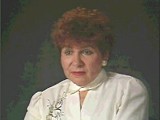
After the Germans annexed Austria in 1938, Leo attempted to flee. He eventually reached Belgium. In 1940 he was deported to the St.-Cyprien camp in France but escaped. In 1942 Leo was smuggled into Switzerland but was arrested and sent back to France, this time to the Rivesaltes and Drancy camps. He and a friend escaped from a train deporting them to Auschwitz in Poland. Leo joined the French underground in 1943. He arrived in the United States in 1947.
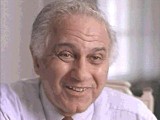
Lisa was one of three children born to a religious Jewish family. Following the German occupation of her hometown in 1939, Lisa and her family moved first to Augustow and then to Slonim (in Soviet-occupied eastern Poland). German troops captured Slonim in June 1941, during the invasion of the Soviet Union. The Germans established a ghetto in Slonim in late 1941, following the massacre of thousands of Jews—especially those who could not prove that they worked. Lisa escaped from Slonim and joined the…
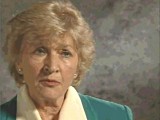
Leopold was a teacher in Krakow, Poland, when World War II began in 1939. While serving in the Polish army, he was captured by Germans. Leopold escaped from a prisoner-of-war transport. Soon after, he met the German industrialist Oskar Schindler. The two became friends. Leopold was forced to live in the Krakow ghetto. He later worked in Schindler's factory in Bruennlitz. He and the other Jews who worked there were treated relatively well and protected from the Nazis. After the war, Leopold moved to the…
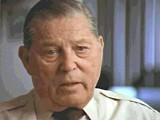
Ludmilla was born to an assimilated Jewish family in Kishinev, Romania. She and her mother, a physician, were living in Poland when the Germans invaded on September 1, 1939. They were taken to Krakow. Ludmilla was forced to live in the Krakow ghetto; her mother was sent to the Warsaw ghetto. Ludmilla worked in a factory at the Plaszow labor camp for a businessman who was a friend of the German industrialist Oskar Schindler. In October 1944, Schindler attempted to save some Jewish workers by relocating them…
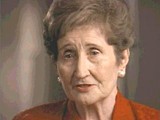
Ludmilla was born to an assimilated Jewish family in Kishinev, Romania. She and her mother, a physician, were living in Poland when the Germans invaded on September 1, 1939. They were taken to Krakow. Ludmilla was forced to live in the Krakow ghetto; her mother was sent to the Warsaw ghetto. Ludmilla worked in a factory at the Plaszow labor camp for a businessman who was a friend of the German industrialist Oskar Schindler. In October 1944, Schindler attempted to save some Jewish workers by relocating them…
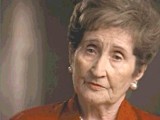
Ludmilla was born to an assimilated Jewish family in Kishinev, Romania. She and her mother, a physician, were living in Poland when the Germans invaded on September 1, 1939. They were taken to Krakow. Ludmilla was forced to live in the Krakow ghetto; her mother was sent to the Warsaw ghetto. Ludmilla worked in a factory at the Plaszow labor camp for a businessman who was a friend of the German industrialist Oskar Schindler. In October 1944, Schindler attempted to save some Jewish workers by relocating them…
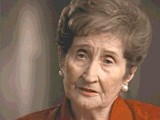
Doriane's Jewish family fled to Amsterdam in 1940, the same year Germany occupied the Netherlands. Her father died after deportation to Auschwitz. After their mother was seized, Doriane and her brother hid with gentiles. The three were reunited at Bergen-Belsen, where they were deported via Westerbork. They were liberated during the camp's 1945 evacuation, when Doriane was 9. Her mother died of cancer soon after Doriane helped her recover from typhus. Doriane and her brother immigrated to the United States.
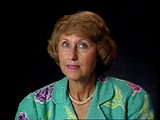
We would like to thank Crown Family Philanthropies, Abe and Ida Cooper Foundation, the Claims Conference, EVZ, and BMF for supporting the ongoing work to create content and resources for the Holocaust Encyclopedia. View the list of donor acknowledgement.